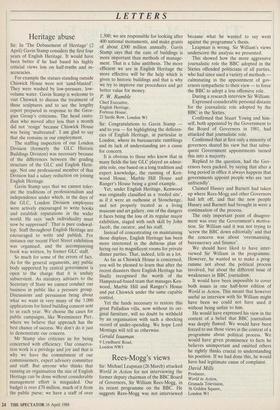Rees-Mogg's views
Sir: Michael Leapman (26 March) attacked World in Action for not interviewing the former deputy chairman of the BBC Board of Governors, Sir William Rees-Mogg, in its recent programme on the BBC. He suggests Rees-Mogg was not interviewed because what he wanted to say went against the programme's thesis.
Leapman is wrong. Sir William's views underscore the analysis we presented.
This showed how the more aggressive journalistic role the BBC adopted in the Sixties offended politicians of all parties, who had since used a variety of methods culminating in the appointment of gov- ernors sympathetic to their view — to force the BBC to adopt a less offensive role.
During a research interview Sir William: Expressed considerable personal distaste for the journalistic role adopted by the BBC in the Sixties.
Confirmed that Stuart Young and him- self, both appointed by the Government to the Board of Governors in 1981, had attacked that journalistic role.
Confirmed that at first only a minority of governors shared his view but that subse- quent Government appointments turned this into a majority.
Replied to the question, had the Gov- ernors been packed, by saying that after a long period in office it always happens that governments appoint people who are 'not unfriendly'.
Claimed Hussey and Barnett had taken up where Rees-Mogg and other Governors had left off, and that the new people Hussey and Barnett had brought in were a continuation of the process.
The only important point of disagree- ment was over the Government's motiva- tion. Sir William said it was not trying to `screw the BBC down editorially' and that the concern was about 'overmanning, bureaucracy and finance'.
We should have liked to have inter- viewed Sir William in the programme. However, he wanted us to make a prog- ramme not about the political process involved, but about the different issue of weaknesses in BBC journalism.
It would have been impossible to cover both issues in one half-hour edition of World in Action. This meant that however useful an interview with Sir William might have been we could not have used it without being unfair to him.
He would have expressed his view in the context of a belief that BBC journalism was deeply flawed. We would have been forced to use those views in the context of a programme about political process. We would have given prominence to facts he believes unimportant and omitted others he rightly thinks crucial to understanding his position. If we had done this, he would have had legitimate cause of complaint. David Mills
Producer, World in Action, Granada Television, 36 Golden Square, London W1






























































 Previous page
Previous page